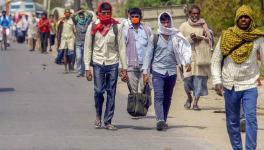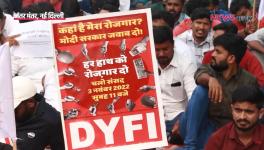Psychology of a Lockdown: A Sudden Halt to Everything Familar is Traumatic
Rather intricate discussions are on about the economic fallout of the ongoing pandemic, while at the same time exclusive focus on the economy is a reason for our inability to deal with Covid-19. The pandemic has suddenly alerted us to the social, personal, emotional and psychological dimensions of life; issues that were waylaid because the spotlight was entirely focused on growth and development. One unmistakable aspect of the pandemic is the emotional trauma it has wrought and our collective inability to develop a social psychology that is necessary even for regular life, but even more essential during a crisis.
In negotiating the after-effects of the pandemic, we need to take into account cultural and emotional aspects of life. Neglecting them and pitching, yet again, for an exclusively economic approach—no matter how sensitive and good it may be—will only reinforce the frameworks that have disabled us during the present crisis.
Psychological and emotional aspects are silent killers—just like the virus. If we do not open this Pandora’s box, it could mutate to create self-defeating dimensions. It has the potential to create mass violence and difficulties for collective living. Life after the pandemic cannot return to “normal” merely by lifting the lockdown, just like it could not be unproblematically implemented, as we did with a four-hour notice. This kind of flattening out of the complexities that overlay social life will bury anxieties, anomie and trauma in the present, but their residue will remain, and their effects could reappear in more damaging forms.
Cultural sociologist Jeffrey Alexander in his book, Trauma: A Social Theory, describes the “idealizing discourse of globalization as a trauma-response to the Cold War”. To emerge from the deadlock of the Cold War, we were compelled to imagine globalisation as a rhizomatic escape from hardships into a Wonderland of opportunities. Similarly, to escape from the threat of the Novel Coronavirus we might end up in a dystopia of persistent insecurity, mutual distrust and violent acquisition. The traits of this are already visible in the rioting in Uttar Pradesh, the chopping off of the hand of a police officer in Punjab, and the attacks on medical and health workers, among others. These are not minor or stray incidents but a consequence of the collective trauma that society is experiencing.
We need to open up to two aspects of this trauma: why people’s emotions have been disturbed by the lockdown and why we are finding ourselves ill-equipped to cope the constrains imposed by the new social/physical distancing norms. There is a layered reality beneath the trauma we are collectively experiencing. Capitalist modernity has dislocated ensconced social life and thrown us into an open life of unexpected adventures. We have moved from ritualised routines to unpredictable encounters. This brought an intensity to life, but broke the continuity of life experiences, turning them into serialised moments. We began to look for meaning in intense experiences. Each moment became indispensable and non-negotiable. From a “way of life” we moved to life without pathways.
In such a context, one end of the social spectrum attempted to reimpose traditional ways, as a mode of resisting the risk that comes with unpredictability. A good example of this is Gandhi’s practice and philosophy: he organised bhajans before every public meeting, but this did not only convey the message of harmonious living. Deploying the form of bhajan highlighted the value of repetitive activity, and created space for the message it conveyed to become a “way of life”. At the same time—and this was Gandhi’s genius—it could equip people, as a collective, to cope with the mundane, banal and the Everyday. This was not lofty idealism but simple everyday actions that held potency. Gandhi wished to demonstrate that life cannot be made a series of ‘high’ points, but that ethics emerged from the slowly-brewed moments that are crafted into our lives.
His use of the Charkha or spinning wheel was yet another instance of using masterly symbolism to demonstrate that life needs to be slow but also creative—he was able to convey that meaning has to be spun out of mundane activities undertaken in everyday life; and that repetitive tasks also wield deep ethical and spiritual content. One cannot build mass movements without grounding them in the certainty of an everyday moral content.
While this traditional view draws on an undeniably organic relation with the individual, personal and social life, the modernist version saw this as a constraining and disciplining force. By contrast, critical theorist Alain Badiou argues that modern life has become inimical to the adventures of falling in love and experiencing the unexpected. There is no love without risk and no risk without being prepared to have an adventure. Modernity created a chimera of opening up avenues for adventure without preparing us for it.
So today, we as a collective are stuck both ways: neither equipped to negotiate with silent, repetitive activities nor for adventures with the unexpected. As a result we are struggling to connect to our own selves. The mundane has become trivial, while adventure has become too risky. It is this no-man’s land of amoral existence that has led to an emotional vacuum. When we are asked to stay at home, it is a moment for introspection, but it is leading to the trauma of facing an emptiness that always existed. We are unable to come to terms with repetitive activities, which have become a source of boredom and loneliness. At the same time we are unprepared for adventures in compassion—unable to even admire the forthright work and risks health workers are taken to fight this pandemic.
We have entered a cul-de-sac and it is going to be blown apart in the near future. We need, as part of the process of opening up the lockdown, to create not empty narratives of solidarity—such as clapping and lighting candles together—but a substantive idea. An idea that will help us negotiate the need for silence with adventures in intense compassion.
The author is associate professor, Centre for Political Studies, JNU. The views are personal.
Get the latest reports & analysis with people's perspective on Protests, movements & deep analytical videos, discussions of the current affairs in your Telegram app. Subscribe to NewsClick's Telegram channel & get Real-Time updates on stories, as they get published on our website.
























